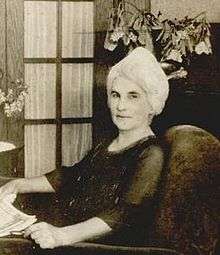Estelle Chisholm Ward
| Estelle Chisholm Ward | |
|---|---|
 June 19, 1938 | |
| Born |
Estelle Chisholm June 18, 1875 Chism, Chickasaw Nation, Indian Territory |
| Died |
December 9, 1946 (aged 71) Oklahoma City, Oklahoma |
| Nationality | American |
| Occupation | educator, journalist, publisher and political activist |
| Years active | 1900-1946 |
| Known for | first Chickasaw woman to represent the tribe's interests in Washington, D. C. |
Estelle Chisholm Ward (1875-1946) was an Oklahoma teacher, journalist and magazine publisher. She was active in politics both civic and tribal and was elected as county treasurer of Johnston County, Oklahoma. Ward was the first woman to represent the Chickasaw Nation as a delegate to Washington, D.C..
Early life
Estelle Chisholm was born on June 18, 1875 in Chism, in the Chickasaw Nation of Indian Territory[1] to Julia Ann (née McLish) and William Chisholm.[2][3] The town was founded and named after her father. Her grandfather was Jesse Chisholm[4] a mixed blood Cherokee-Scottish trader, after whom the Chisholm Trail was named.[5] Her mother's parents were Ginny "Gincy" (née Colbert) and George Frazier McLish, who were of Chickasaw and Scottish descent.[3] By her father's first wife, Hester Butler Cochran, she had a half-sister, Caroline, as well as seven full siblings: Eliza, Angeline, Mary V., Alice, Cora Ann, Julia Ann and William Jr.[2]
Chisholm attended the Bloomfield Academy and after graduating, taught in the school for a couple of years. She then attended Kidd College in Sherman, Texas from 1894 to 1895, before moving to Bowling Green, Kentucky to attend Potter College.[1]
Career
Upon completing her education, Chisholm began teaching at Burris Chapel School,[1] a neighborhood school which was part of the Chickasaw education system and located near Tishomingo.[6] On December 23, 1896 in the Chickasaw Nation she married William Thomas Ward, who would serve as the long-time auditor of the Chicaksaw tribe and later as a deputy United States clerk.[7] They lived on their farm and raised their children in Garrett Township, near Tishomingo through the 1920s and then kept a home in Oklahoma City.[1][8][9] She was a member of the National Bureau of Women Speakers and contributed articles to newspapers both inside and outside of Oklahoma.[1] Ward published and edited a magazine in Oklahoma City called the Super Civilized Indian.[10]
Ward was involved in politics and was elected as Johnston County Treasurer, as well as running several campaigns for Republican candidates.[1] In 1928, she attended a convention of Choctaw and Chickasaw tribe members from throughout Oklahoma in Ardmore. The purpose of the convention was to discuss both financial issues and the burdens being placed upon the tribes because of implementation of the Indian Citizenship Act and the Burke Act. The tribes were concerned about the inability to secure funds that were due them from the government for their coal and asphalt lands. They selected committee representatives, all men save Czarina Conlan for the Choctaw tribe and Ward for the Chickasaw, to draft a solution.[11] The committee met to prepare the recommendations and decided to send Conlan and Ward to Washington, D.C.. It was the first time women had been sent to Washington as tribal representatives for either tribe. The women's task was to argue in favor of passage of a bill proposed by U.S. House Representative Wilburn Cartwright for sale of the coal and asphalt holdings, as well as continuing the restrictions of selling Indian lands.[12]
Ward died on December 9, 1946 in Oklahoma City, Oklahoma[13] and was buried at City Cemetery in Tishomingo, Oklahoma.
References
Citations
- 1 2 3 4 5 6 Thoburn & Wright 1929, p. 748.
- 1 2 Pangburn 1994, p. 133.
- 1 2 Walker 2012, p. 61.
- ↑ Shirk 1987, p. 50.
- ↑ Conley 2007, pp. 64-65.
- ↑ Williams 1942, p. 150.
- ↑ The Ada Evening News 1905, p. 2.
- ↑ U. S. Census 1910, p. 15-A.
- ↑ U. S. Census 1920, p. 7-A.
- ↑ The Daily Ardmoreite 1926, p. 3.
- ↑ The Daily Ardmoreite March 25, 1928, p. 3.
- ↑ The Daily Ardmoreite April 3, 1928, p. 2.
- ↑ The Chronicles of Oklahoma 1948, p. 360.
Bibliography
- Conley, Robert J. (2007). A Cherokee Encyclopedia. Albuquerque, New Mexico: University of New Mexico Press. ISBN 978-0-8263-3951-5.
- Pangburn, Richard L. (1994). Indian Blood. Louisville, Kentucky: Butler Books. ISBN 978-1-884532-05-4.
- Shirk, George H. (1987). Oklahoma Place Names. Norman, Oklahoma: University of Oklahoma Press. ISBN 978-0-8061-2028-7.
- Thoburn, Joseph B.; Wright, Muriel H. (1929). Oklahoma, a history of the state and its people. 4. New York, New York: Lewis Historical Publishing Company, Inc. OCLC 903928097.
- Walker, Rickey Butch (2012). Chickasaw Chief George Colbert: His Family and His Country. Killen, Alabama: Bluewater Publications. ISBN 978-1-934610-71-8.
- Williams, Robert L. (June 1942). "Hindman H. Burris 1862-1940". Chronicles of Oklahoma. Oklahoma City, Oklahoma: Oklahoma Historical Society. 20 (2): 149–151. ISSN 0009-6024.
- "1910 U.S. Federal Census: Johnston County, Oklahoma". FamilySearch. Washington, D. C.: National Archives and Records Administration. May 18, 1910. Retrieved 14 August 2016.
- "1920 U.S. Federal Census: Johnston County, Oklahoma". FamilySearch. Washington, D.C.: National Archives and Records Administration. January 22, 1920. Retrieved 14 August 2016.
- "Ardmore Acts as Host to Indians". Ardmore, Oklahoma: The Daily Ardmoreite. September 14, 1926. Retrieved 14 August 2016 – via Newspaperarchive.com.

- "Ben Colbert Indicted". Ada, Oklahoma: The Ada Evening News. June 24, 1905. Retrieved 14 August 2016 – via Newspapers.com.

- "Chickasaws and Choctaws to Send Delegation to Capital". Ardmore, Oklahoma: The Daily Ardmoreite. March 25, 1928. Retrieved 8 August 2016 – via Newspaperarchive.com.

- "Indians Break Precedents to Send Women Representatives". Ardmore, Oklahoma: The Daily Ardmoreite. April 3, 1928. Retrieved 8 August 2016 – via Newspaperarchive.com.

- "In Memoriam". Chronicles of Oklahoma. Oklahoma City, Oklahoma: Oklahoma Historical Society. 26 (1). Spring 1948. ISSN 0009-6024. Retrieved 14 August 2016.